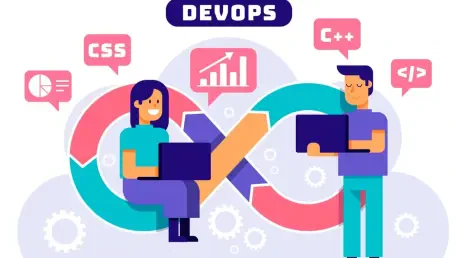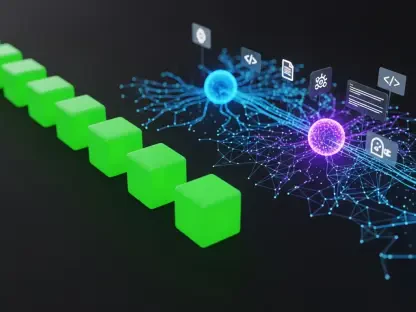Setting the Stage for Innovation in AI and Data Engineering
In an era where artificial intelligence (AI) powers everything from personalized recommendations to autonomous vehicles, the efficiency of data pipelines has become a critical determinant of success, and a single error in a data workflow can derail an AI model’s predictions, costing a company millions in lost opportunities and damaged trust. This underscores the pressing need for precision and reliability in managing complex data systems. As organizations race to deploy intelligent solutions at scale, integrating robust operational frameworks has emerged as a vital strategy to ensure seamless performance and rapid innovation.
The intersection of DevOps with AI and data engineering represents a transformative shift in how technology-driven industries operate. DevOps, a methodology rooted in collaboration and automation, offers a structured approach to streamline development and deployment processes. Its relevance is evident in the growing reliance on data as the lifeblood of AI, where even minor inefficiencies can cascade into significant setbacks. This report explores how DevOps practices are reshaping the landscape of data workflows and AI applications, addressing the challenges and opportunities that define this dynamic field.
Understanding the Role of DevOps in AI and Data Pipelines
DevOps serves as a foundational framework that bridges the gap between development and operations, ensuring that AI systems and data pipelines function with heightened efficiency. By fostering a culture of collaboration between traditionally siloed teams, it enables smoother integration of complex algorithms and vast datasets into production environments. This alignment is crucial in a technology landscape where AI-driven solutions are increasingly central to business strategies across sectors like healthcare, finance, and retail.
Key DevOps practices such as Continuous Integration (CI) and Continuous Delivery (CD) play a pivotal role in enhancing data workflows. CI ensures that code changes are regularly tested and merged, minimizing integration issues, while CD automates the deployment of validated updates to production, reducing delays. For major industry players, these practices translate into faster iteration cycles for AI models, allowing companies to stay competitive in rapidly evolving markets where timely deployment is paramount.
The reliance on data pipelines as the backbone of intelligent systems has never been more pronounced. These pipelines, responsible for extracting, transforming, and loading data, must operate with precision to prevent errors that could compromise AI outputs. DevOps introduces reliability through automated testing and monitoring, ensuring that data integrity is maintained at every stage. This focus on accuracy is essential for applications where flawed data can lead to incorrect predictions or operational failures.
Core Benefits of DevOps for AI and Data Pipeline Efficiency
Key Trends Driving DevOps Adoption
A surge in automation is one of the primary trends propelling DevOps into the forefront of AI and data engineering. As data workflows grow in complexity, manual processes become unsustainable, prone to errors and inefficiencies. Automation tools embedded within DevOps practices mitigate these risks by handling repetitive tasks like data validation and deployment, freeing up teams to focus on innovation rather than troubleshooting.
Another driving force is the escalating demand for faster development cycles amid competitive pressures in AI innovation. Organizations are compelled to deliver updates and new features at an unprecedented pace to capture market share. DevOps facilitates this speed through streamlined CI/CD pipelines, supported by emerging tools that enhance scalability and adaptability across diverse environments, from startups to global enterprises.
Market dynamics also play a significant role, with the need for robust scalability pushing the adoption of DevOps further. As data volumes expand exponentially, systems must handle increased loads without sacrificing performance. The integration of cloud-native technologies and containerization within DevOps frameworks addresses this need, ensuring that data pipelines remain resilient under pressure and adaptable to future growth.
Performance Impacts and Growth Insights
The impact of DevOps on operational efficiency is measurable through key metrics such as reduced error rates and accelerated release cycles. By automating testing and deployment, organizations can minimize human-induced mistakes, ensuring higher data integrity across AI systems. This reliability is critical for maintaining trust in applications where accuracy directly influences user experience and business outcomes.
Growth in DevOps adoption is particularly notable among AI startups and large enterprises alike, driven by the need to manage expansive data ecosystems. Smaller firms leverage these practices to iterate quickly on innovative models, while established corporations use them to maintain consistency across sprawling infrastructures. This dual appeal highlights the versatility of DevOps in addressing varied organizational needs.
Looking ahead, the role of DevOps is poised to expand in managing large-scale data systems. As industries continue to harness AI for real-time decision-making, the demand for seamless, error-free pipelines will intensify. Forward-thinking companies are already investing in advanced DevOps tools to prepare for this shift, recognizing their potential to unlock new efficiencies and drive sustained growth in a data-centric world.
Challenges in Implementing DevOps for AI and Data Workflows
Integrating DevOps into AI and data pipelines presents technical complexities that can hinder smooth adoption. One significant hurdle is managing transitions between diverse environments, such as development, testing, and production, where discrepancies in configurations can lead to failures. Addressing these issues requires meticulous planning and robust automation to ensure consistency across the pipeline lifecycle.
Cultural resistance within organizations poses another barrier, as teams accustomed to traditional workflows may hesitate to embrace automation and collaborative practices. This reluctance can slow down implementation and undermine the benefits of DevOps. To counter this, phased rollouts and comprehensive training programs can help ease the transition, fostering buy-in from stakeholders at all levels.
Market-driven challenges, such as the pressure to balance speed with quality, further complicate the integration process. Rushing deployments to meet tight deadlines risks introducing defects, while excessive caution can delay critical updates. Strategies like incremental testing and feedback loops can mitigate these tensions, enabling organizations to maintain high standards without sacrificing agility in competitive landscapes.
Navigating Compliance and Security in DevOps for AI Systems
The regulatory landscape surrounding AI and data pipelines imposes stringent requirements that DevOps must address to ensure compliance. Data privacy laws and industry standards demand rigorous safeguards, particularly when handling sensitive information in automated workflows. Non-compliance can result in severe penalties and reputational damage, making adherence a top priority for organizations.
Security remains a cornerstone of DevOps practices, especially within CI/CD pipelines where vulnerabilities can be exploited if left unchecked. Implementing secure coding practices and regular audits during integration and delivery phases helps protect against breaches. This proactive approach is vital for maintaining the integrity of AI systems that rely on vast datasets often containing personal or proprietary information.
The impact of compliance and security measures extends to trust in AI applications, influencing how end-users perceive and interact with technology. By embedding regulatory checks and encryption protocols into DevOps processes, organizations can build confidence among stakeholders. This trust is indispensable in sectors where reliability and data protection are non-negotiable, reinforcing the value of secure, compliant workflows.
The Future of DevOps in AI and Data Pipeline Innovation
Emerging technologies, such as AI-driven automation tools, are set to redefine the scope of DevOps in managing data pipelines. These advancements promise to enhance predictive maintenance and error detection, allowing systems to self-optimize with minimal human intervention. Such innovations could significantly elevate the efficiency of AI deployments over the coming years.
Consumer expectations for intelligent systems are also evolving, with a growing demand for real-time data processing and personalized experiences. DevOps is well-positioned to meet these needs by enabling rapid updates and scalable architectures. As global economic trends shift toward digital transformation, the methodology will likely become a linchpin for organizations aiming to stay ahead of market demands.
Regulatory shifts on a global scale will continue to shape the trajectory of DevOps adoption in AI. Stricter data governance frameworks may introduce new compliance challenges, but they also present opportunities for innovation in secure pipeline management. Companies that anticipate these changes and adapt their DevOps strategies accordingly will likely gain a competitive edge in an increasingly regulated environment.
Reflecting on Strategic Pathways Forward
Looking back, the exploration of DevOps in AI and data pipelines revealed its indispensable role in driving precision and reliability through automation and structured processes. The journey highlighted how CI/CD practices tackled inefficiencies, reduced errors, and accelerated innovation across diverse industries. Challenges like technical complexities and cultural resistance emerged as significant hurdles, yet strategic solutions such as phased implementations proved effective in overcoming them.
As a next step, organizations should prioritize investments in advanced DevOps tools tailored for AI-specific needs, focusing on scalability and real-time processing capabilities. Building cross-functional teams trained in both DevOps and data engineering can further bridge operational gaps, fostering a culture of collaboration. By proactively addressing compliance and security demands, companies can position themselves as leaders in delivering trustworthy AI solutions.
Beyond immediate actions, a long-term commitment to integrating emerging automation technologies will be crucial for staying competitive. Exploring partnerships with tech providers to co-develop customized DevOps frameworks could unlock new efficiencies. Ultimately, embracing these pathways ensures that businesses not only adapt to current demands but also shape the future of intelligent systems with confidence and foresight.









